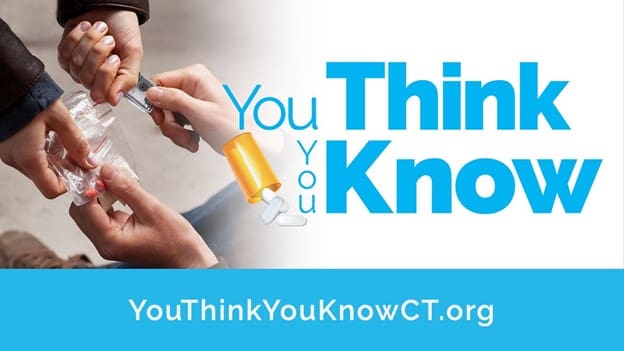
“You think you know, but you can’t be sure what’s inside.” The You Think You Know Campaign was created in response to the recent trend in counterfeit pills that have caused overdose deaths in people of all ages across the country. By visiting the campaign’s website, you can access tools, research and resources to become educated on drug misuse and the counterfeit pill crisis.
"You Think You Know was the result of a collaboration between prevention professionals working at the local and regional level, as well as the New England HIDTA. We all brought our expertise, perspectives and local data to the development and design of the campaign, and we were able to pool our financial resources and create something that could be used [in Connecticut] statewide,” said Project Director of Trumbull’s Prevention Partnership, Melissa McGarry.
“We all shared the mission to educate families about the potentially deadly risks of counterfeit medications, but also about all the reasons why teens and young adults might misuse prescription medications, where they get them and what resources are available. Our collaboration amplified the impact of our campaign and allowed us to spread the message statewide. We also wanted to create materials that other prevention coalitions in the state could access.”
Trumbull’s Prevention Partnership (TPAUD) was one of five coalitions in the state of Connecticut, in addition to other partners, that worked together to create this campaign. The collaboration began in February and led to a website launch in September of this year.
“TPAUD, Trumbull’s Prevention Partnership, became involved in the campaign from the very beginning, when we were approached by a parent in our town who had lost their young adult son during the pandemic shutdown. He was struggling with anxiety and trying to sleep and thought he was taking a Xanax – he didn’t realize that the pill was laced with fentanyl. The family reached out to us because they had no idea that their son was taking this medication or the risks of overdose. They wanted to save other families, and they asked us to educate parents about the real risks of counterfeit medications. At the same time, our partners at the NE HIDTA were also warning us about the rise in opioid-laced counterfeit meds,” continued Melissa.
A committee of eight to ten representatives met bi-weekly over the months from the inception of the campaign to its launch in September. “We recently found out that coalitions will be required by the state (Department of Mental Health and Addiction Services) to promote and utilize this campaign as part of the state Opioid Response grant. We look forward to seeing it expanding throughout the state, so we can continue getting the word out and adding materials onto the site, because it’s going to evolve over time,” shared Anna Gasinski, Connecticut Public Health Analyst for the Overdose Response Strategy (ORS) program, in partnership with the CDC and HIDTA.
“Our hope for this campaign is that families will be more educated about the real risks of counterfeit medications. Our young people are misusing medications for anxiety and depression, to improve academic and athletic performance, to deal with pain or to get high. They don’t realize the risk of getting medication from a friend or classmate, the guy from the gym or someone on social media. Our mission is to educate parents and guardians, so that they can have ongoing conversation with teens, college students and young adults about the real dangers of taking a prescription medication not prescribed to them. We also wanted to offer families resources and support, which is an important element of the YTYK campaign,” Melissa added.
“We are most proud that we could respond to and work with this local family to create something accessible and informative, and that we were able to build an educational resource tool that could potentially save other lives.”
Le You Think You Know Campaign also recently received a MarCom marketing award this fall. Visit YouThinkYouKnowCT.org to learn more and access materials.


